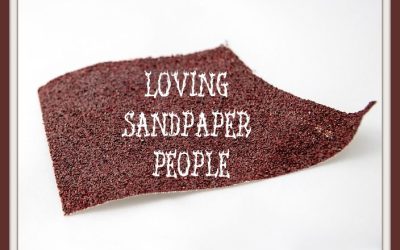Hot Buttons
We all have them. Hot buttons. Sore spots, tender to even a verbal touch. When poked, these sore spots provoke us to instinctive reactions. They spring from feeling challenged or irritated.
Hot buttons leave us vulnerable to being provoked. And if we know the hot buttons of others, it’s tempting for us to provoke them, too. The results can get ugly. Just try to have a discussion about politics with someone who disagrees with you!
Provocation is not limited to our horizontal relationships. Several times in the Old Testament we read how the ancient Israelites challenged, tested, or provoked God with their sin and unbelief. God wanted His best for His people, and His best could only come when they worshiped Him alone. Their repeated rebellion and idolatry were like a knife in His heart, and brought upon themselves His righteous anger. Time and again, God warned His people of the consequences of their actions and appealed to them to repent and return to Him.
Unlike God, however, when we’re provoked, our human responses are not always righteous or just. We often respond out of hurt or anger, without regard to the consequences for us or others. Even when we’re the ones doing the provoking, we may not realize the emotional—and sometimes physical—damage unleashed on the person we’ve hurt.
So what’s the solution?
Pride demands that our opinions and rights be honored—and everyone else better get out of the way. Humility helps us see our circumstances from God’s perspective. It helps us understand that He may not fulfill our desires because He has a better plan. No one is powerful enough to thwart God’s best for us! Do we really believe He is the one guiding and directing us?
Humility keeps us from provoking others. And humility, in turn, enables us to guard our tongue from impulsive reactions when we are provoked.
King David modeled this when he was provoked. Absalom had staged a coup and seized the throne. While David was on the run from his own son, he endured the added humiliation of being cursed by a man named Shimei (2 Samuel 16). Rather than commanding his general to kill Shimei, David understood God was his defender.
We offer this advice so casually when we’re comforting a friend being provoked. But when we’re the victim of provocation, that’s a different story. We may say God is our defender, but our actions and reactions often communicate that we need to defend ourselves.
The best example
David isn’t the only person in the Bible who humbly responded to being provoked. Hundreds of years before the incarnation of Jesus, Isaiah prophesied the Messiah would “not open his mouth” despite severe provocation (Isaiah 53:7).
When Peter took up a sword to defend his Master in the Garden, Jesus reminded him, “Do you think I cannot call on my Father, and he will at once put at my disposal more than twelve legions of angels?” (Matthew 26:53). God the Son—the One who could have called an angel army to wipe out His enemies—stood quietly as He was spit on, beaten with fists, slapped, and taunted before being cruelly executed (Matthew 26:67-68).
Withstanding the temptation to respond rashly when we’re provoked requires the kind of humility Jesus exhibited. Before we protest that He’s God and we’re not, remember every child of God has His indwelling Holy Spirit to guide, equip, and empower us to live in a way that honors our heavenly Father.
We live in a culture where an abundance of topics are hot buttons for almost everyone. How might God be calling you and me to walk in humility, guarding our tongues when we’re tempted to react in anger?






0 Comments